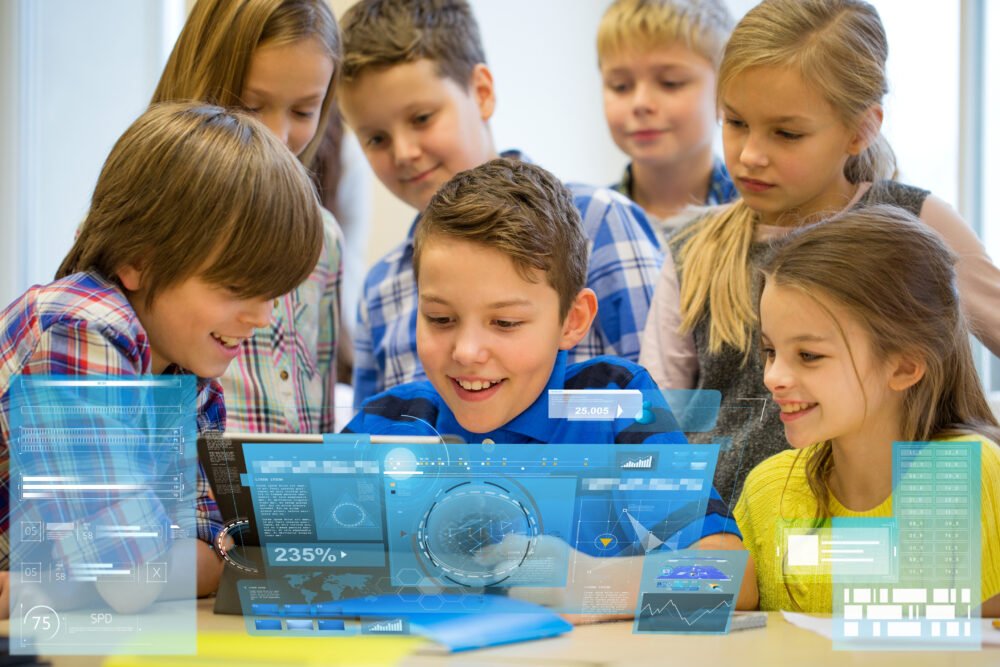As the GCC countries fast track their education reforms, AI and advanced technologies are reshaping classrooms, curricula and infrastructure. Suppliers are adapting to the new ways of education by turning into active participants, taking on a more proactive role in the realignment through advanced customisation and AI integration
Nov 10, 2025, Dubai: The education sector in the GCC is undergoing a steady transformation fuelled by policy initiatives encouraging overall quality enhancement, skill alignment and inclusivity – measures aimed at enhancing employability, economic diversification and positioning the region among the world’s top education performers.
Amidst ongoing efforts in aligning the existing system with AI, sustainability, innovation and refining the curriculum, education suppliers and solution providers in the region are taking on a more proactive role in this realignment.

“Suppliers are no longer mere providers; they are strategic partners shaping learning ecosystems that are adaptive, innovative and purpose-driven,” says Jamal Sarwar Sabri, Group CEO, ALMOE Group, an audio-visual distributor which also provides customised solutions for schools and educational institutions in the GCC.
Education suppliers in the GCC are fast adopting to the development, procurement and distribution model of AI-integrated products and solutions for K-12 and higher education institutions. Schools and other education institutions are also prioritising procurement based on how suppliers position products and services.
Manit Gosalia, Cofounder & CEO, Albie, an education-focused AI company building custom AI language models for schools, says the region is witnessing a shift from digital adoption to AI transformation in classrooms. Schools are prioritising personalized learning, data-driven insights and teacher enablement to meet students’ changing expectations. “In places such as the UAE and Saudi Arabia, education leaders aren’t just integrating technology, they’re reimagining the classroom as a dynamic, intelligent environment where learning adapts to every student in real time,” says Gosalia.

Albie, according to him, is building the first AI operating system for schools, a layer of intelligence that personalizes learning for every student while empowering teachers with real-time insights.
“Our platform integrates directly with a school’s existing curriculum, turning static content into interactive, adaptive learning journeys. For students, Albie acts as a personal AI tutor that understands their pace, confusion points, and curiosity, guiding them through curriculum-aligned conversations. For teachers, it becomes a teaching assistant that surfaces analytics on learning gaps, engagement trends, and readiness levels across the class. In essence, we’re helping schools move from using AI as a tool to building AI into the fabric of learning itself, ensuring personalization doesn’t replace teachers but amplifies them,” says Gosalia.

Sarry Hattar, Product Manager, Edunation says in a rapidly changing educational environment, schools across the MENA region are seeking technology that simplifies operations, connects communities, and supports meaningful education.
“Education in the region is evolving towards AI data-based decision-making, multilingual accessibility, and greater inclusion. Institutions now need platforms that can respond to diverse curricula and national requirements while ensuring smooth coordination between management, educators, students, and guardians,” says Hattar.
According to him, Edunation has been leading this transformation through EdunationOS, a unified digital ecosystem that brings every element of school life together from teaching and learning, students wellbeing, revenue management, and policy implementation.

As Zeid Ibrahim Fahoum, CEO, Bravo Software FZ-LLC notes that it is not just the government policies but private schools too that are prioritising the transformation. BravoBravo 2.0 was designed precisely around these trends. The platform integrates AI-driven personalization, adaptive assessment, and curriculum mapping for Arabic language education.
“Every student’s learning path is shaped by performance data – the system automatically suggests exercises, stories, and remedial activities aligned with national standards in countries such as Saudi Arabia, the UAE, and others,” says Fahoum.
According to PowerSchool, provider of cloud-based software to schools, the interest in AI among schools has only been growing over the years. The results of its recent ‘AI in Education’ survey conducted in collaboration with YouGov, gathering insights from more than 300 educators across the UAE and Saudi Arabia, point to 91% of educators expressing willingness to use AI tools to support learning and automate school processes.
The findings revealed that 95% of educators in Saudi Arabia and 79% in the UAE believe AI should be taught from an early age. Furthermore, 66% of UAE educators recognise AI’s positive impact on teaching, while 88% highlight the need for more professional development to keep pace with technological change.
Earlier, the 2024 Education Focus report in the US, revealed that 70% of district leaders saw AI’s potential to enhance teaching and learning. In 2023, the number stood at just 53%.

“These results show that while AI adoption is growing rapidly, there is a clear need for continued innovation and training to ensure educators are empowered to focus on what matters most – student engagement and outcomes,” says Fadi Abdulkhalek, Vice President and General Manager, Europe, Middle East & Africa, PowerSchool. Its Arabized platform, Abdulkhalek says streamlines educators’ work by eliminating manual translation tasks, supporting right-to-left interfaces, and incorporating features like the Hijri calendar overlay. PowerBuddy for Learning, according to him, now supports Arabic, enabling students to receive real-time homework help and personalized content in their native language – advancing digital equity and national education goals.
For Turnitin, a provider of plagiarism detection and academic integrity tools the introduction of AI is driving a fundamental shift in education, moving the focus from strict prohibition toward fostering responsible use and transparency in the learning process.

Amal Dimashki, Regional Director – MENAT at Turnitin says, “A serious concern driving this trend is the risk that extensive AI use could limit student creativity and impair cognitive development, thus challenging the most basic purpose of education: teaching students how to think. Therefore, institutions are seeking solutions that create transparency in how the student has used AI, allowing educators to set assignment-specific policies and ensure fair, equitable learning outcomes.”
Sabri says Almoe’s interactive displays, classroom technologies, and digital learning platforms are now built to support AI integration, cloud connectivity, and hybrid learning models, adding that the products are designed to help educators create engaging and inclusive classrooms – whether students are learning in person or remotely.
Meanwhile, the transition from traditional systems to new technologically advanced systems is influencing the way both class rooms and school infrastructure is being designed. Newly planned projects are moving away from traditional, static layouts toward flexible, adaptive spaces that support personalized, collaborative, and immersive learning. Architects are prioritizing “future-proof” infrastructure in newer school buildings that can seamlessly embed technology and evolve with pedagogical innovations.

Charlotte Borghesi, Founder & General Manager of Kidzink & Koda, the Kidzink Office of Design and Architecture says they are seeing significantly more intentionality in design among both premium schools as well as budget-friendly affordable schools.
“Competition amongst school operators is intense, which means design is now a critical lever for differentiation. We are seeing world-class sports and performing arts facilities becoming the regional benchmark, concept-driven restaurants rather than cafeterias, and dedicated areas to support wellness, rest and community connection. Schools are increasingly being designed not just to teach students well, but to support their holistic wellbeing, create meaningful belonging, and prepare them for the world they will move into,” says Borghesi.
Kidzink and Koda and its multidisciplinary teams, she says work with schools, “to help them differentiate in a way that is not just commercially competitive, but meaningfully improves student, educator and family experience. For us, design is not simply about aesthetics, it is about outcomes.”
Meanwhile Brands are also taking on a more proactive approach regarding training teachers and educators through special training sessions, certifications, conferences and continuous technical assistance and refresher sessions.
Fahoum says BravoBravo offers comprehensive onboarding, webinars, and interactive video tutorials that guide teachers step by step on how to effectively use BravoBravo.
Through PowerSchool University (PSU), PowerSchool offers extensive professional development and support to help educators effectively use its solutions in the classroom. “We maintain ongoing engagement with schools through education summits and customer events. The Edge Leadership Summit Middle East in Dubai on 14 November is designed specifically for school leaders across the Middle East, providing a platform to connect, exchange insights, and gain a competitive edge in today’s evolving education landscape,” says Abdulkhalek. According to him, the goal is to make AI feel intuitive, ethical, and empowering, so teachers can focus less on administration and more on meaningful learning experiences.
Albie conducts live workshops, guided demos, and interactive classroom simulations that help educators experience how AI can enhance not replace their teaching practice.”Beyond setup, teachers receive ongoing professional development through the Albie Teacher Dashboard, which provides insights on class performance, student misconceptions, and engagement trends. Our team runs continuous training cycles and feedback sessions, ensuring educators stay comfortable with evolving AI capabilities,” says Gosalia.
Edunation has also been training teachers through structured training programs and live onboarding sessions. “Eeducators learn to adopt digital tools confidently and integrate them into daily teaching,” says Hattar.
Turnitin says its support is grounded in the principle that AI detection is “a tool” and should not be used in isolation. “We provide valuable data, but the final determination of misconduct must rest with the educator based on institutional policies and context,” says Dimashki.
Meanwhile, suppliers are also ensuring they go an extra mile in ensuring their software solutions follow the core principles of maintaining high standards of security, governance and privacy, bias resistance and fairness, transparency, accessibility and digital equity.
“Customers retain full ownership of their data, and collection, storage, and sharing are limited to authorized educational purposes with explicit consent from schools, parents, or students,” says Abdulkhalek.
These standards he says are reinforced through advanced K–12 cybersecurity measures, including code scanning, enterprise-grade firewalls, and over 30 annual penetration tests, with independent audits ensuring compliance with global security benchmarks.








